

Components
- 1 Game board
- 20 count strategy map pad
- 315 army, navy, and national control markers
- 1 Rulebook
Game Play
All turns are divided into "spring" and "fall" with the game starting in spring 1901.
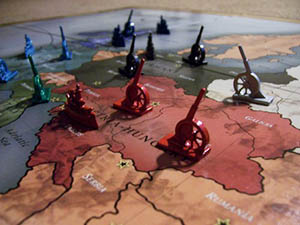
Each turn has a serie of phase:
Spring 4 phase turn:
- Diplomatic phase
- Order Writing phase
- Order Resolution phase
- Retreat and Disbanding phase
Fall 5 phase turn:
- Diplomatic phase
- Order Writing phase
- Order Resolution phase
- Retreat and Disbanding phase
- Gaining and Losing Units phase
I. Diplomatic Phase
During this phase, the players meet to discuss their plans for the upcoming turns. Alliances and strategies are made. Usually, they last around 15 minutes but may end sooner if all players agree.
During this phase, players may say anything, they can go to seperate rooms to have private talks, they can spread rumours. They can make public announcements and publish even written agreements and documents, however they do not bind a player to keep their promises.
II. Order Writing Phase
Each player writes secretly their "orders" for every unit on a paper. All orders must be dated. e.g. "Spring 1902" or "Fall 1903", ... Later, all orders will be revealed at the same time.
If the order is illegal, miswritten or ambiguous then the units hold position. You can't let players decide what they meant to write AFTER they see other people's moves; it ruins the whole game.
Not more than 5 minutes should be allowed for writing orders after the diplomatic negotiation period has ended.
Order Format
In each order, the type of unit is written first ("A" for army or "F" for fleet) followed by the province they unit occupies. Then the order is given (Hold, Move, Support, Convoy). After that a target province can follow.
Units
There are two types of units (army and fleet) and they have all equal strength.
Orders or Moves
A piece may only do one of the following things in any turn:
-
Move
A move order is written with a dash. e.g. A Paris-Picardy means that an army must move (attack) from Paris to Picardy.
Army Movement
An army can move into an adjacent inland or coastal province but not into water. If the adjacent target province is occupied, then no move will be executed.
Fleet Movement
A fleet can move to an adjacent water or coastal province but not into inland.
Every location on the map that has no name can't be occupied. e.g. Switzerland, Corsica are impassable. Armies can move between Sweden and Denmark in one turn.
Standoffs
This is when forces of equal strength try to occupy the same province at the same turn. These rules apply when one or more countries are involved:
-
Units of equal strength try to occupy the same province cause all those units to remain in their original provinces.
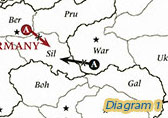
-
A standoff doesn't dislodge the unit already in the province where the standoff took place.e.g. in Diagram 1, the unit in Silesia will hold position.
-
One unit not moving can stop a unit or series of units from moving.
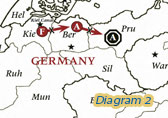
-
Units can't trade places without the use of a convoy.
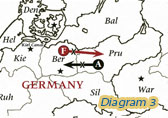
-
Three or more units can rotate provinces during a turn.
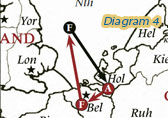
-
-
Support
Since all units have the same strength, one unit can't attack and advance against another without help. That help is called "support". If an attack is successfull, the attacking unit will move into that target province.
If the unit that was attacked had no orders to move elsewhere, it is defeated and dislodged from the province. The dislodged unit must retreat or be disbanded.
Support can be offensive or defensive. It can be give to a fellow unit or to another player's unit.
By supporting each other, units gain increased strength.
Support from other players can't be refused.
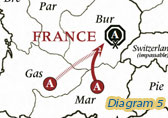
A support order is written with an S. e.g. A Paris S A Marseille-Burgundy means that an army in Paris must support an Army in Marseille that is attacking Burgundy.
A unit not ordered to move can be supported by a support order that only mentions its province.
e.g. F Denmark S F Baltic. So, the fleet in Denmark will support the fleet in Baltic as long as the fleet in Baltic don't move.
A unit ordered to move can only be supported by a support order that matches the move.
e.g. A Paris S A Marseille-Burgundy. The Army of Paris will support the attack on Burgundy only if the army from Marseille is really attacking Burgundy. If the Army of Marseille holds its position or move to Gasconny, then no support will be given.
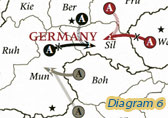
A dislodged unit can still cause a standoff in a province different from the one that dislodged it.
The Austrian attack from Bohemia will dislodge the German army in Munich. However, that Army in Munich will still cause a standoff with the Russian Army trying to enter Silesia.
A dislodged unit, even with support, has no effect on the province that dislodged it.
If two units are ordered to the same province and one of them is dislodged by a unit coming from that province, the other attacking unit can move. This situation doesn't result in a standoff since the dislodged unit has no effect on the province that dislodged it.
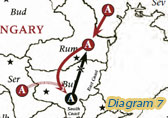
The Russian Army in Rumania dislodges the Turkish Army in Bulgaria. That Turkish Army and the Russian Army in Sevastopol are ordered to attack Rumania which would normally cause a standoff but because the Turkish Army was dislodged, there will be no standoff.
The Russian Army of Sevastopol can enter Rumania and the Turkish Army of Bulgaria must retreat.
Cutting Support
Support can be cut and this causes that the support order fails and support will be given.
Support is cut if the unit giving support is attacked from any province except the one where support is being given.
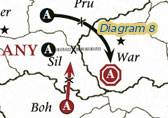
The support from the Army in Silesia is cut by an attack from Bohemia. Notice that it was enough to attack a supporting army to cut the support.
It is not necessary to dislodge the supporting unit to cut that support.
Support is cut if the unit giving support is dislodged
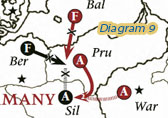
If a unit ordered to support is dislodged by an attack then the support is cut.
The Russian Army coming from Prussia dislodges the German Army in Silesia. The support of the Silesian Army is thus cut and the German Army in Berlin stands off the Russian Fleet in the Baltic.
A unit being dislodged by one province can still cut support in another province.
Just as a unit being dislodged by one province can still cause a standoff in another, a unit still manages to cut support even if it's dislodged.
Just make sure that the dislodgment isn't coming from the province where the unit is giving support.
Remember this rule: A dislodged unit, even with support, has no effect on the province that dislodged it).
Note: In complicated situations, it helps to first determine what support, if any, is cut. Once this is determined, it's easier to resolve orders. -
Convoy
Convoying An Army Across 1 Water Province
A fleet in a water province can convoy an army from any adjacent coastal province to any other coastal province adjacent to that water province.
Fleets in a coastal province can't convoy.
A fleet can't convoy more than one Army at the same time.
A convoy order is written with a C. e.g. A Ankara-Sevastopol, F Black Sea C A Ankara-Sevastopol.
The Fleet must contain both the location and the destination of the Army being convoyed.
Support can't be convoyed.
Only attacks can be convoyed.
Convoying an Army Across Several Water Provinces
If fleets occupy adjacent water provinces, an Army can be convoyed through all these water provinces on one turn, landing in a coastal province adjacent to the final Fleet in the chain.
Disrupting a Convoy
Dislodgment of a fleet in a convoy causes the convoy to fail.
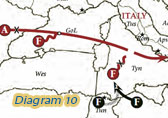
If a Fleet ordered to convoy is dislodged during the turn, the Army to be convoyed remains in its original province.
The Fleet in the Tyrrhenian is dislodged, so the French Army doesn't move from Spain to Naples.
An attack on a convoying Fleet, which doesn't dislodge it, doesn't affect the convoy.
A convoy that causes the convoyed Army to standoff at its destination results in that army remaining in its original province.
-
Hold.
Do nothing, hold your position.
III. The Order Resolution Phase
After all the orders have been revealed and read, the players must resolve all the conflicts.
Resolution will result in successful moves, failed moves, standoffs, retreats and disbandments.
The units on the map are moved and removed as described in the next two phases of play.
IV. Retreat and Disbanding Phase
After the conflicts has been resolved, any dislodged (defeated) units must make their retreat.
These retreats are written down like orders and immediately revealed without any prior diplomacy or discussion.
Retreats can't be convoyed or supported.
A dislodged unit must retreat to an adjacent province.
But A unit can't retreat to:
- a province that is occupied
- the province of the attacker
- a province that was left vacant by a standoff during the same turn.
If a dislodged unit can't retreat (for any reason), then the unit will be removed from the map.
e.g. if two or more units are ordered to retreat to the same province, then they all will be removed.
A unit can always voluntarily disband (removed) instead of retreating.
V. Gaining and loosing units Phase
Controlling Supply Centers
After each Fall turn, players check to see how many supply centers they control or occupy.
Once a power have control of a suply center, it can leave the center vacant and still keep control of it until another player occupies that province after the Fall turn.
In other words, a player can only get control of a supply center when he occupies it after the Fall turn.
Adjusting number of units
After each Fall turn (including retreats), players adjust their units to match the number of supply centers they control.
This can result in some units being removed when the player has lost supply centers. The owner can decide which units.
When the player gained supply centers or when a player has more supply centers than units, he is allowed to built extra units.
New units can be placed in each unoccupied supply center of its home country that are still in control.
Only Army units can be built on an inland province supply center.
A player can decline to build a unit for any reason.
Writing Builds and Disbandments
Players write down which units they will remove (disband) and what type of units must be built in the home supply centers.
All these orders are revealed simultaneously and no prior discussion or diplomacy is allowed during the writing.
Vague or invalid orders must be ignored.
Continue Reading


